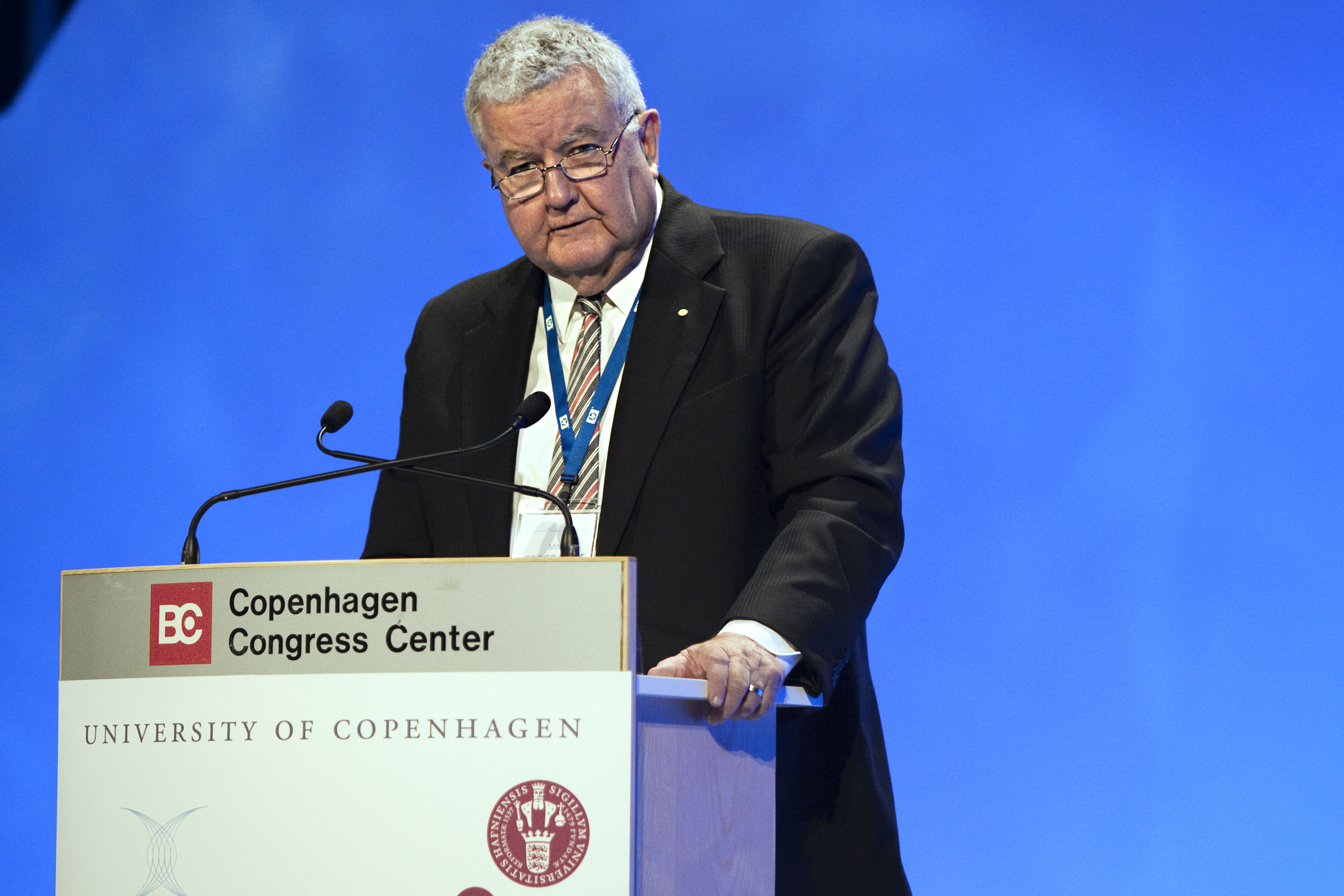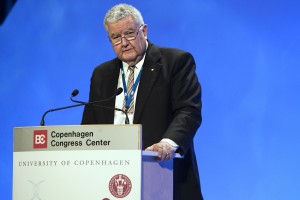“Smarter, more competitive, more productive”, the Chief Scientist, Professor Ian Chubb on Australia’s Future in Science & Technology

There is no doubt in the mind of Australia’s Chief Scientist, Professor Ian Chubb, the future will be shaped by science technology, engineering and mathematics. Unfortunately, he finds that at present the standing of science, as an expert authority, is being challenged. Furthermore, Ian Chubb finds that the science message is getting lost in the white noise of the mainstream media. I was heartened to hear his positive words about science communication, social media, science and technology education and innovative Australian workplaces.
These were the messages from Ian Chubb at an address he gave as part of NICTA’s Big Picture Seminar series on Wednesday March 28, 2012 at the University of Melbourne.
It was refreshing to see Australia’s Chief Scientist out and about and addressing public forums such as this one. Although judging by the faces, the suits and the overheard conversations at the drinks and nibbles prior to the address, I think this was definitely a speech to the science and technology faithful. That is a pity, his words were worth exposure and considered comment in the mainstream Australian media.

Professor Ian Chubb emphasises Mathematics, Engineering and Science provide the enabling skills and knowledge that underpin every aspect of modern life. They help us understand the natural world and enable us to respond as humans to this world with a constructed view aimed at improving the lot of human kind.
In Australia, as in many economies, we have observed a decline in the number of people choosing a career in these disciplines. Not only that, the STEM subjects (Science Technology Engineering and Mathematics), as he called them, are taken for granted or simply ignored. Although it is obvious without at least an appreciation of these subjects, a modern citizen is hampered in their ability to critically evaluate and make informed decisions about the issues that are shaping their future. Among his many roles as Australia’s Chief Scientist, Professor Ian Chubb has been charged with examining this decline and offering strategies to address it.
Professor Ian Chubb is eminently suited to this task. He was appointed to the position of Chief Scientist on 19 April 2011 and commenced the role on 23 May 2011. Prior to his appointment as Chief Scientist, Professor Ian Chubb was Vice-Chancellor of the Australian National University. Professor Chubb’s research focused on the neurosciences. Although he jokingly said on the night he would prefer not to be quizzed, on science specifics, by such an informed audience. He has co-authored some 70 full papers and co-edited one book all related to his research. In 1999 Professor Chubb was made an Officer of the Order of Australia (AO) for “service to the development of higher education policy and its implementation at state, national and international levels, as an administrator in the tertiary education sector, and to research particularly in the field of neuroscience”. In 2006 he was made a Companion (AC) in the order for “service to higher education, including research and development policy in the pursuit of advancing the national interest socially, economically, culturally and environmentally, and to the facilitation of a knowledge-based global economy”. I certainly expect to see some informed, well-researched and erudite outputs from his office over the next few years.
On the evening he emphasized that we in the audience have an important role to play. He seized upon two, in my mind important aspects: the first was the quality and engagement of science teaching in schools and the second was science communication into the mainstream consciousness.
Ian Chubb sees a key way to develop a more scientifically and technologically literate Australia is to enable the sciences at the primary and secondary school level. He sees this as the way to demonstrate how useful science; scientific concepts and processes are to everyday lives. To do this we need to have inspirational teachers. Teachers who are creative and imaginative and can make the subject interesting without being simplistic. It still needs to be challenging, that is part of science. He sees CSIRO outreach programmes being and integral part of this. By tackling the problem at this level he believes we can make science relevant and part of the community values.
The second part focused on scientists doing media better and media doing science better. This he trusts will change the current state of ill-informed debate that occurs about many subjects in the public media. He, thankfully, pressed home that communicating science better needs to be a goal of the practicing scientists, and the learned science, technology, engineering and mathematics professional. The existing discipline silos also hamper us taking advantage of what we do have. The pieces of the jigsaw are still separated on the table rather than being used to advantage.
Ian Chubb is also a fan of social media. I see eye-to-eye with him on that social media can get science into the mainstream of people’s consciousness. It can bring immediacy about the scientific process; the rigour, analysis and observation that are part of science in practice. He also emphasized that we take a PhD to mean “educated intelligent person” rather than the narrow view of “researcher” as is commonly held. The universities and commercial workplaces need to see these people as key to creating an innovative workplace. A workplace that will transform traditional Australian economies.
In conclusion he saw that for Australia to become smarter, more competitive, and more productive we need to have a cultural change. A change that enables people to understand that science and technology is good and a common cause. A change, that needs to start right now. I am enthused and ready, how about you?
 Follow
Follow
The complete transcript of Professor Ian Chubb’s presentation to NICTA is now available to download from his Chief Scientist’s website Here: http://bit.ly/H6iJ67